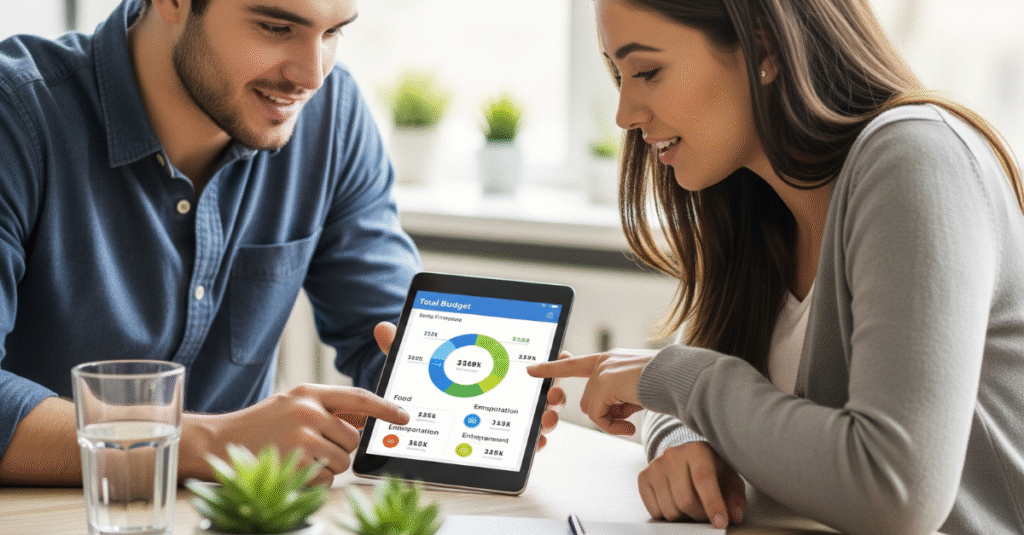Best Budgeting Apps for Beginners 2025 Managing your money can feel overwhelming when you’re just starting out. Whether you’re fresh out of school, starting your first job, or simply taking control of your finances for the first time, budgeting is the foundation of financial stability.
The good news? You don’t need to be a math genius or a spreadsheet wizard. In 2025, budgeting apps have made it easier than ever to track your spending, plan your savings, and achieve your goals — all from your phone.

In this guide, we’ll explore the best budgeting apps for beginners, compare their features, and help you choose the right one for your needs.
Top 10 Best Budgeting Apps for Beginners 2025
Best Budgeting Apps for Beginners 2025 Starting a budget can be intimidating. Budgeting apps simplify the process by:
- Automating expense tracking (linking to bank accounts, credit cards, and digital wallets)
- Visualizing your spending with charts and categories
- Setting reminders so you never forget bills or savings goals
- Providing insights that help you make smarter choices
Unlike manual budgeting, these apps handle the heavy lifting — giving you more time to focus on making progress.
How to Choose the Right Budgeting App as a Beginner
Best Budgeting Apps for Beginners 2025 Before downloading the first app you find, consider these beginner-friendly criteria:
| Criteria | Why It Matters |
| Ease of Use | The simpler the interface, the faster you’ll stick to it. |
| Free or Low Cost | Many great apps are free or offer affordable plans. |
| Automation | Linking accounts saves time and reduces manual errors. |
| Goal Tracking | Helps you stay motivated by seeing progress. |
| Security | End-to-end encryption is a must for financial data. |
| Cross-Device Sync | Access your budget on phone, tablet, or computer. |
Top 10 Best Budgeting Apps for Beginners in 2025
Here’s our handpicked list of apps that make budgeting simple, even if you’ve never tracked a dollar before.
1. Mint – Best All-in-One Free Budgeting App
Overview:
Mint has been a household name in budgeting for years. It automatically syncs with your bank accounts, credit cards, and bills to give you a complete financial picture.Best Budgeting Apps for Beginners 2025.
Pros & Cons:
| Pros | Cons |
| Free to use | Ads can be distracting |
| Automated expense tracking | Limited customization |
| Credit score monitoring | Not ideal for complex budgets |
Best For: Beginners who want a one-stop solution without paying a subscription.
Pricing: Free
2. YNAB (You Need A Budget) – Best for Learning Budgeting Skills
Overview:
YNAB is more than an app — it’s a budgeting philosophy. It teaches you to “give every dollar a job” and be intentional with your spending.Best Budgeting Apps for Beginners 2025.
Pros & Cons:
| Pros | Cons |
| Excellent educational resources | $14.99/month or $99/year |
| Real-time syncing | Steeper learning curve |
| Goal-setting tools | Requires active participation |
Best For: Beginners who want to develop long-term money management habits.
Pricing: Paid (34-day free trial)
3. Goodbudget – Best for Manual Budgeting Beginners
Overview:
Goodbudget uses the envelope budgeting system, where you allocate money into categories (envelopes) before spending.
Pros & Cons:
| Pros | Cons |
| Simple and visual | Manual entry for transactions |
| Great for shared budgets | Free plan limits envelopes |
| Works without linking accounts | Lacks automation |
Best For: Beginners who prefer hands-on budgeting without connecting bank accounts.
Pricing: Free (Paid plan $8/month)
4. PocketGuard – Best for Spending Control
Overview:
Pocket Guard’s “In My Pocket” feature shows exactly how much money you can safely spend after covering bills and savings goals.
Pros & Cons:
| Pros | Cons |
| Very beginner-friendly | Free version is limited |
| Focuses on disposable income | Requires account linking |
| Helps prevent overspending | Advanced features require upgrade |
Best For: Beginners who tend to overspend and need guardrails.
Pricing: Free (Premium $7.99/month)
5. EveryDollar – Best for Simple Zero-Based Budgeting
Overview:
Created by personal finance expert Dave Ramsey, Every Dollar follows a zero-based budgeting method where every dollar is assigned a purpose.
Pros & Cons:
| Pros | Cons |
| Very easy to use | Paid version needed for bank sync |
| Based on proven system | Limited free features |
| Goal tracking included | Best suited for Ramsey followers |
Best For: Beginners who want a straightforward budgeting approach.
Pricing: Free (Paid $12.99/month)
6. Wally – Best for International Users
Overview:
Wally supports multiple currencies, making it ideal for users outside the U.S. or those dealing with foreign transactions.
Pros & Cons:
| Pros | Cons |
| Multi-currency support | Interface can be cluttered |
| Customizable categories | Learning curve for setup |
| Free core features | Lacks strong automation |
Best For: Beginners who need flexibility and international support.
Pricing: Free (Premium available)
7. Monefy – Best for Quick Expense Tracking
Overview:
Monefy is a lightweight, no-frills app that makes recording expenses as quick as tapping a button.
Pros & Cons:
| Pros | Cons |
| Extremely simple UI | Lacks advanced features |
| Minimal setup required | Manual entry |
| Affordable premium option | No in-depth reporting |
Best For: Beginners who want the fastest, simplest expense tracker.
Pricing: Free (Pro $2.99)
8. Zeta – Best for Couples Budgeting Together
Overview:
Zeta allows couples to manage shared and individual expenses while keeping finances transparent.
Pros & Cons:
| Pros | Cons |
| Designed for couples | Limited features for solo users |
| Shared and personal views | Fewer integrations than bigger apps |
| Free to use | Not as feature-rich for investments |
Best For: Couples starting their budgeting journey together.
Pricing: Free
9. Honeydue – Best for Relationship-Friendly Budgeting
Overview:
Honeydue makes budgeting fun and collaborative for couples by adding chat features and bill reminders.
Pros & Cons:
| Pros | Cons |
| Chat feature for money talk | Designed only for couples |
| Bill reminders | Limited goal tracking |
| Free to use | No desktop version |
Best For: Couples who want an interactive approach to budgeting.
Pricing: Free
10. Simple Budget Planner – Best Spreadsheet-Style App
Overview:
For those who love spreadsheets but want automation, Simple Budget Planner offers the best of both worlds.

Pros & Cons:
| Pros | Cons |
| Spreadsheet feel | Less beginner-friendly UI |
| Good reporting | Requires manual setup |
| Affordable pricing | Limited mobile features |
Best For: Beginners comfortable with basic spreadsheets.
Pricing: $4.99/month
Free vs. Paid Budgeting Apps
For beginners, free apps like Mint, Good budget, and Pocket Guard are often enough.
However, paid apps like YNAB or Every Dollar Premium provide more automation,Best Budgeting Apps for Beginners 2025 support, and customisation — which can be worth it if budgeting becomes part of your long-term plan.
Step-by-Step Guide to Starting Your First Budget
- Download Your Chosen App
Pick one from our list and install it. - Link Accounts (Optional)
This saves time, but you can also enter transactions manually. - Set Budget Categories
Examples: Rent, groceries, transportation, entertainment, savings. - Track for One Month
Let the app record spending or add entries daily. - Review & Adjust
See where you overspent and adjust categories for next month.
FAQs – Best Budgeting Apps for Beginners
Q1: What is the easiest budgeting app to use?
Best Budgeting Apps for Beginners 2025 Mint and Money are among the simplest for beginners.
Q2: Are budgeting apps safe?
Most reputable apps use bank-level encryption and do not store your login credentials.
Q3: Can I budget without linking my bank account?
Yes. Apps like Good budget and Monefy allow manual entry.
Q4: Which budgeting app works best for couples?
Zeta and Honeydew are designed specifically for couples.
Final Thoughts
The best budgeting app for beginners depends on your personal style, goals, and comfort with technology.
If you want automation and convenience, start with Mint.
If you want to learn financial discipline, YNAB is worth the investment.
And if you want to keep it simple, Monefy or Good budget will serve you well.The key is to start. Pick one app, commit for a month, and watch your financial confidence grow.